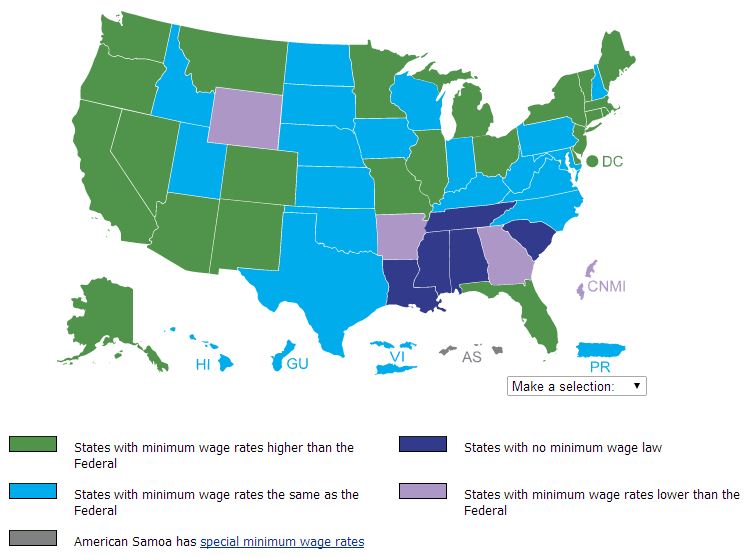Labor Day is a delicate subject and I wont get all comprehensive and thorough here but I will point out that I do agree with the following, limited, remarks by Kenyan born Obama in Milwaukee on Labor Day 2014:
“…something that sometimes the American people take for granted:
“the 40 hour work week
“overtime pay
“a minimum wage
“Weekends like this one
All that didn’t happen by accident…”
I too believe that many Americans take the above cited luxuries for granted. Some even seem to believe that the above cited specific luxuries are somehow inherent facets of capitalism.
Over a period time luxuries such as minimum wage became a part of the legal framework in our capitalistic state (US). However, just because you are a capitalist state doesn’t imply that you have a minimum wage law(s).
Having said that I also want to point out that business owners, or employers, don’t usually provide those luxuries to employees out of compassion for their fellow man, they provide the said luxuries because its law in the United States of America.
It should also be noted that Louisiana, Mississippi, Alabama and South Carolina do not have minimum wage laws of their own.
Once you leave the United States, western Europe, New Zealand and a few other select places on the globe this is what you will find (and I have personally worked under these conditions) in other capitalist states:
1. Minimum wage does not exist.
2. IMPORTANT (read carefully): Minimum wage may exist but is not, not even remotely, by any interpretation or inference, sufficient to sustain life.
You might ask, “If it’s not enough to sustain life then how do these people survive?”
Answer: They supplement their income by hunting elephants for their tusks (cruel in the minds of the fat and overfed Americans and western Europeans), they cut down their forests, they overfish the river and seas (I’m serious, I like to fish and I know places where you can’t catch anything due to overfishing), they liter (being trendy and saving the earth doesn’t mean much to a person who is hungry, on a tight schedule and living in a place where you can’t even drink the water from the faucet), they use others and lie to family and friends to get ahead, they skim from any source available (e.g., Coca Cola delivery driver skims 3 bottles from each crate and clients consider it normal that each crate is always missing 3 bottles), they lie to their boss or employer, they allow their daughters to marry at age 14, they allow their children to work at ages as young as 6 rather than go to school, they commit crimes, they murder for very small sums of money.
3. Minimum wage may exist but in practice, regardless of how the law reads, does not exist outside of exceptional places of employment.
4. IMPORTANT (read carefully): Minimum wage exists but in the form that Americans are not familiar with. Many undeveloped or developing countries do have a minimum wage but they are calculated by weeks or months, not hours. Yes, I know, you call it a salary. But in the United States when you think salary you think professional job. Not here, salary is for all jobs, even scrubbing toilets. Most minimum wages are a monthly minimum, often paid twice a month. An example may be $200 US Dollars (or much less) per month.
There is no stipulation of how many hours may be lawfully worked per day.
There are no stipulated days off.
An employee may work 10 to 16 hours per day, and 6 or 7 seven days per week and take home $100 US Dollars every two weeks.
5. Overtime (mandated by law) does not exist.
6. Overtime (mandated by law) may exist but in practice, regardless of how the law reads, does not exist outside of a exceptional places of employment.
7. A very large majority of the population does not earn more than the minimum wage.
Now, having noted the foregoing 1 thru 7, please also consider the following:
About a month ago I was having a discussion with some Americans about work in the Dominican Republic.
I told them that some people in the Dominican Republic refuse to work because when they receive their pay check (when they’ve worked in the past) they basically or essentially earned just enough to be reimbursed for what they’d spent for their lunches (or whatever meal fell within work schedule) and the money that they’d spent on public transportation and private transportation.
I stated that they worked 10 hours days and then came home tired and then woke up to it all over again and that it just wasn’t worth it.
A couple of the American women who were listening made faces and rolled their eyes and made comments to the effect that the account that I was giving sounded normal to them and they wake up to it every day in the United States.
Inside I was a little upset but I kept a level-head and, a few minutes later, politely excused myself from the discussion and made myself forget them and I quickly got back to working on my goals and enjoying time with friends and family.
I will, however, share my thoughts with readers here regarding the group of Americans.
This group of Americans were well-fed, they eat very well and apparently everyday and at anytime they desired.
They drove nice cars with air conditioning. They have memberships at gyms to keep in shape. They have plenty of food in their refrigerators. They have electricity 24 hours a day. The water in their houses (the water faucets) can be used for drinking water. Their houses are much larger than one-room-like-house divided into a bathroom, kitchen, two bedrooms and a living room.
When they wake up in the morning it isn’t to 90% inside-weather and they don’t have to squirm around between the bed, the kitchen stove, the dresser, make their way to a barrel of water, fill up a bucket, then wiggle over to the bathroom, use an empty “I can’t believe it ain’t freaking butter” container to dump water over their body and brush their teeth, then dress themselves with cloths that were washed by hand, then unlock the padlock on their front door, walk quickly down out down the street where the “non-workers” often woke up early (it’s strange, not an American thing) only to meet and ask (insist) that the “workers” loan them a 50 cents or a dollars (and if you don’t…you may get a lip busted), then you hop into a old minivan with doors torn off and then squish your body between 30 other bodies in a van designed for 9 or 10 bodies.
Then there’s work part: at very least 9 hours a day, and typically 10 or 12 hour a day, no less than 6 days a week, and earn the minimum wage of $200 US dollars per month.
Then they make their way home, and if its dark outside in becomes all the more dangerous. They make it home and then dump a few more buckets water, and one for the toilet because that’s how it flushes. They smack several mosquitoes to their deaths and maybe if they have a wife or a husband they make love and then they falls asleep and get a 4 or 5 hour sleep and then wake up and do it again.
The workers age quickly (inward and outward) and many die of old age at around 50-55.
AND THEY DO IT ALL WITH A SMILE AND UPLIFTING MUSICAL SOUNDS!
I don’t think that this particular group of Americans whom I was having a discussion with, last month, could handle more than a week of that above referenced way of life and wouldn’t be surprised if they took their own lives (i.e., suicide) if they were ever subject to an everyday life of the above referenced way of life.
Btw:
Obama also closed with a good joke, and it was true:
“Every gray hair (Obama’s) is worth it…and at least I (Obama) still got some hair”
If you are a bald guy, its pretty hard to call someone else out for their gray hairs.
United States Department of Labor: Minimum Wage Laws in the States January 1st 2014
Please exercise your free speech in the comments section below. There are no stipulations of political correctness on this blog. Speak your mind, give us your thoughts, both objective and subjective. Share your ideas, hunches, inklings or your expertise. Please provide recommendation and corrections if you spot errors in fact within the blog report. Lastly, remember that posting a comment is much like casting a vote, so please do so.










August 30th 2014
Obama’s Labor Day Message: Raise the minimum wage
I also want to add that several years ago, before I ever heard of Barack Obama, I wasn’t a proponent of minimum wage laws.
However, after some years of living abroad (outside of the United States) that is no longer my position.
I didn’t happen overnight, it was something that happened gradually.
Minimum wage and other legal framework in a capitalistic state is a complicated and delicate subject and I don’t wish to get all comprehensive and thorough on this subject.
Readers are welcome to be as comprehensive and thorough as they wish here in the comments section.
MINIMUM WAGE LAWS – Lucas and I will just have to respectively disagree on this topic
————————————————
How Minimum Wage Laws Increase Poverty
Ludwig von Mises Institute
George Reisman
4/4/2014
Excerpt:
An Open letter to Thomas Perez, U.S. Secretary of Labor
Dear Secretary Perez:
Raising the minimum wage is a formula for causing unemployment among the least-skilled members of society. The higher wages are, the higher costs of production are. The higher costs of production are, the higher prices are. The higher prices are, the smaller are the quantities of goods and services demanded and the number of workers employed in producing them. These are all propositions of elementary economics that you and the President should well know.
It is true that the wages of the workers who keep their jobs will be higher. They will enjoy the benefit of a government-created monopoly that excludes from the market the competition of those unemployed workers who are willing and able to work for less than what the monopolists receive.
The payment of the monopolists’ higher wages will come at the expense of reduced expenditures for labor and capital goods elsewhere in the economic system, which must result in more unemployment.
Those who are unemployed elsewhere and who are relatively more skilled will displace workers of lesser skill, with the ultimate result of still more unemployment among the least-skilled members of society.
The unemployment directly and indirectly caused by raising the minimum wage will require additional government welfare spending and thus higher taxes and/or greater budget deficits to finance it.
Your and the President’s policy is fundamentally anti-labor and anti-poor people. While it enriches those poor people who are given the status of government-protected monopolists, it impoverishes the rest of the economic system to a greater degree. It does this through the combination both of taking away an amount of wealth equal to the monopolists’ gains, and of causing overall production to be less by an amount corresponding to the additional unemployment it creates. The rise in prices and taxes that results from raising the minimum wage both diminishes the gains of the monopolists and serves to create new and additional poor people, while worsening the poverty of those who become unemployed.
Furthermore, the higher the minimum wage is raised, the worse are the effects on poor people. This is because, on the one hand, the resulting overall unemployment is greater, while, on the other hand, the protection a lower wage provides against competition from higher-paid workers is more and more eroded. At today’s minimum wage of $7.25 per hour, workers earning that wage are secure against the competition of workers able to earn $8, $9, or $10 per hour. If the minimum wage is increased, as you and the President wish, to $10.10 per hour, and the jobs that presently pay $7.25 had to pay $10.10, then workers who previously would not have considered those jobs because of their ability to earn $8, $9, or $10 per hour will now consider them; many of them will have to consider them, because they will be unemployed. The effect is to expose the workers whose skills do not exceed a level corresponding to $7.25 per hour to the competition of better educated, more-skilled workers presently able to earn wage rates ranging from just above $7.25 to just below $10.10 per hour. The further effect could be that there will simply no longer be room in the economic system for the employment of minimally educated, low-skilled people.
Of course, the minimum-wage has been increased repeatedly over the years since it was first introduced, and there has continued to be at least some significant room for the employment of such workers. What has made this possible is the long periods in which the minimum wage was not increased. Continuous inflation of the money supply and the rise in the volume of spending and thus in wage rates and prices throughout the economic system progressively reduce the extent to which the minimum wage exceeds the wage that would prevail in its absence. The minimum wages of the 1930s and 1940s — 25¢ an hour and 75¢ an hour — long ago became nullities. To reduce and ultimately eliminate the harm done by today’s minimum wage, it needs to be left unchanged.
The standard of living is not raised by arbitrary laws and decrees imposing higher wage rates, but by the rise in the productivity of labor, which increases the supply of goods relative to the supply of labor and thus reduces prices relative to wage rates, and thereby allows prices to rise by less than wages when the quantity of money and volume of spending in the economic system increase.
If raising the standard of living of the average worker is your and the President’s goal, you should abandon your efforts to raise the minimum wage. Instead, you should strive to eliminate all government policies that restrain the rise in the productivity of labor and thus in the buying power of wages.
If your goal is to raise the wages specifically of the lowest-paid workers, you should strive to eliminate everything that limits employment in the better-paid occupations, most notably the forcible imposition of union pay scales, which operate as minimum wages for skilled and semi-skilled workers. In causing unemployment higher up the economic ladder, union scales serve to artificially increase the number of workers who must compete lower down on the economic ladder, including at the very bottom, where wages are lowest. To the extent that occupations higher up could absorb more labor, competitive pressure at the bottom would be reduced and wages there could rise as a result.
…………………………………
View the complete article at:
http://mises.org/daily/6714/How-Minimum-Wage-Laws-Increase-Poverty
Minimum Wage: The Ups & Downs
The New American
Michael Tennant
6/11/2014
Excerpt:
Politicians — particularly Democrats — have been stumping for an increase in the federal minimum wage for some time now. And with 2014 being an election year, the calls for hiking the wage from $7.25 an hour to $10.10 an hour — a 39-percent jump — are growing ever louder; and they are getting results.
The nation’s politician in chief, President Barack Obama, called for a minimum wage hike in his last two State of the Union addresses. In 2013 he said, “Let’s declare that in the wealthiest nation on Earth, no one who works full-time should have to live in poverty, and raise the federal minimum wage to $9.00 an hour.” Such a move, he claimed, would “raise the incomes of millions of working families,” stimulate the economy, and reduce dependence on government handouts.
This year, having upped the ante to $10.10 an hour, Obama called on Congress to put the minimum wage increase to a vote. “You’ve got a choice,” he said. “You can give America the shaft, or you can give it a raise.” That remark drew “thunderous applause” from the audience at the University of Michigan, reported the New York Times.
While Congress has thus far refused to pass a bill raising the federal minimum wage, there has been considerable action on the state level. As of this writing, 10 states plus the District of Columbia have increased their minimum wages since February 2013, and most of the remaining states — and even some cities — are considering doing so.
“The result is an outside-the-Beltway variation on Mr. Obama’s pledge to use his executive powers to bypass an obstructionist Republican Party in Congress,” the Times observed. “In this case, White House aides said they believed that Mr. Obama’s feverish rhetorical push for a higher minimum federal wage … has helped generate political pressure on states to act.”
Meanwhile, inside the Beltway, Obama issued an executive order in February imposing his preferred minimum wage on federal contractors — a move of rather dubious legality, as we shall see.
The rhetoric from Obama and other proponents of a minimum wage hike suggests that the government can, by mere fiat, repeal the law of supply and demand. These people seem to believe that increasing the cost of labor will have no effects other than putting more cash into laborers’ hands. However, as the Cato Institute’s Mark Wilson pointed out in a 2012 report, “The higher costs will be passed on to someone in the long run; the only question is who.”
Brother, Can You Spare $10.10?
First and foremost among those paying for a minimum wage boost are those who are — or would like to be — employed at the present minimum. Wrote Wilson:
It’s not difficult to understand why this is the case. Consider a teenager applying for his first job. He probably has few skills relevant to the job and no work experience. He will be relatively unproductive at first, perhaps generating just eight dollars per hour of revenue. If the minimum wage is $7.25 an hour, he may be hired; but if the minimum is hiked to $8.01 or higher, he will not. Instead, prospective employers will hire already skilled workers or automate jobs that were previously performed by unskilled workers.
Those unskilled workers who manage to retain their jobs despite the mandated raise won’t necessarily be better off, either. Their employers are likely to reduce fringe benefits and on-the-job training to help offset the higher wages. “This is why labor force participation rates fall and quit rates rise when the minimum wage rises, in contrast to what would happen if those workers were made better off,” Gary Galles observed in a piece for the Ludwig von Mises Institute.
None of this is breaking news, Wilson noted:
Particularly hard-hit by the new law were poorer areas, especially Puerto Rico, where, according to Wilson, “an estimated 120,000 workers … lost their jobs within the first year of implementation … and the island’s unemployment rate soared to nearly 50 percent.” Congress soon passed an amendment to the FLSA establishing special committees to determine the appropriate minimum wage levels for Puerto Rico and the Virgin Islands.
Since then, Congress has increased the minimum wage 22 times and expanded the law’s coverage to about 85 percent of the workforce; and with each increase, the results have been the same. The most recent FLSA amendments raised the minimum wage in the states incrementally from 2007 to 2009 and provided for a longer phase-in period for the Northern Mariana Islands and American Samoa to bring them up to parity with the rest of the country. Despite this extended rollout, the wage hike took such a toll on the economy of American Samoa that Congress passed and Obama signed legislation postponing some of the increases.
The same employment effects occur when states raise their minimum wages. Most states have their own minimum wages, and under the FLSA, state minimums higher than the federal minimum take precedence. A March study by the American Action Forum found that
Likewise, a 2012 study by Joseph Sabia, Richard Burkhauser, and Benjamin Hansen concluded that New York’s 2004-2006 $1.60-per-hour minimum wage hike was “associated with a 20.2 to 21.8 percent reduction in the employment of younger less-educated individuals, with the largest effects for those ages 16-to-24.”
Nor are the unemployment effects of the minimum wage limited to the United States. According to a report by Johns Hopkins University economics professor Steve Hanke, the 21 countries in the European Union (EU) that impose minimum wages had an average unemployment rate of 11.8 percent in 2012, while the average rate among the remaining seven countries was just 7.9 percent. Furthermore,
Recent reports indicate that another U.S. minimum wage hike will continue the job-killing pattern of previous ones. In February, the Congressional Budget Office (CBO) projected that the proposed increase could cost as many as one million jobs. The March Duke University/CFO magazine Global Business Outlook Survey found that nearly half of U.S. retail firms and about a third of U.S. service and manufacturing firms would reduce jobs if the minimum wage were hiked to $10.10 an hour. That same month, Express Employment Professionals, the nation’s largest privately held staffing firm, released a survey of small businesses revealing that 19 percent would cut jobs and 39 percent would reduce hiring under the same minimum wage increase. Even worse, of those businesses that currently pay the minimum wage to some of their employees, 38 percent said they would lay people off and 54 percent would hire fewer.
With Friends Like These…
Thus, there is no doubt whatsoever that raising the minimum wage will result in significant job losses. What’s more, those losses will be concentrated in those groups that proponents of the wage hike claim to be trying to help.
“The minimum wage has its greatest impact on the market for teenage labor,” wrote Harvard University’s Greg Mankiw. “The equilibrium wages of teenagers are low because teenagers are among the least skilled and least experienced members of the labor force…. As a result, the minimum wage is more often binding for teenagers than for other members of the labor force.”
According to Mankiw, “The typical study finds that a 10 percent increase in the minimum wage depresses teenage employment between 1 and 3 percent.” Imagine what a 39-percent increase would do.
Minorities, who in many instances are already struggling to find work, are also harmed by the minimum wage. “In the United States,” Thomas Sowell pointed out, “the last year in which the black unemployment rate was lower than the white unemployment rate — 1930 — was also the last year when there was no federal minimum wage law.” The next year saw the passage of the Davis-Bacon Act, which required workers on federal projects to be paid the local prevailing wage for their jobs. By its supporters’ own admission, the law was passed in part to prevent blacks who were willing to work for lower wages from taking jobs that would otherwise have gone to whites. As Sowell’s remark about the black unemployment rate indicates, it succeeded.
The current unemployment rate for all teenagers is about 21 percent; for black teenagers, it is about 36 percent. “In 2007, prior to the Great Recession, the black teen unemployment rate was about 29 percent,” penned Forbes’ James Dorn. “There is no doubt the increase in the federal minimum wage from $5.15 to $7.25 per hour contributed to the higher unemployment rate. If Congress passes a new minimum wage law … we can expect further erosion of the market for unskilled workers, especially black teens.”
The Obama administration claims that raising the minimum wage is “especially important for women.” But according to the Employment Policies Institute (EPI), “Women would actually be disproportionately harmed by the President’s minimum wage proposal.” (Emphasis in original.) The administration based its assertion on the number of jobs held by women that will be covered by the proposal, under the assumption that everyone covered by the higher minimum wage will actually retain his or her job. EPI, however, found that 57 percent of the jobs the CBO projects will be lost under a minimum wage hike are held by women.
Minimum wage increases have other ill effects besides reducing employment for unskilled workers. A 1995 review of 50 years’ worth of research on the minimum wage for Congress’ Joint Economic Committee on Taxation concluded that, among other things, minimum wage hikes also increase job turnover, discourage part-time work, reduce school attendance, drive up teenage crime rates (because of higher teen unemployment), and encourage employers to hire illegal aliens. Other studies have found that increased minimum wages can lead to smaller raises for employees already making above the minimum as employers try to offset the additional costs. Then there is the ever-popular method of passing the increased costs on to consumers. Wilson cited studies finding that “a 10 percent increase in the U.S. minimum wage raises food prices by up to 4 percent and overall prices by up to 0.4 percent” and “restaurant prices unambiguously increase in response to minimum wage increases.”
……………………………………..
View the complete article at:
http://www.thenewamerican.com/economy/economics/item/18428-minimum-wage-the-ups-downs
I agree with the thoughts expressed regarding the minimum wage laws discussed in the two above posted articles.
However, it seems to me that a higher and more comprehensive PERSPECTIVE and STRUCTURE are needed in order for ‘FREE MARKET CAPITALISM’ to function at its best for ALL a country’s citizens.
I view the ideal ‘free market capitalistic society’ as requiring the following three components, which can be roughly likened to a three-legged stool.
(1) The COUNTRY must be based on an intelligent, supportive, WRITTEN CONSTITUTION that is maintained as intended by the founders unless legally amended according to written law.
(2) The basic functioning unit of that country’s population must be a STRONG, SUPPORTIVE TRADITIONAL FAMILY.
(3) Organized RELIGIONS, freely formed by groups of people within the society, must be allowed to compete in order to formally maintain the country’s culture and help promote MORALITY of the people. The religions themselves should rely on the concepts contained in written ‘constitutions’ such as the Bible, Torah, etc.
I realize that NONE of the above three requirements is currently functioning properly in the U.S.A. or probably anywhere else in the world to any significant extent. Still, I think the IDEAL is worth pursuing.
———————————————–
Applying the above to the Minimum Wage Laws: The organized RELIGIONS in the country should, as one of their many important tasks, be frequently reminding the CAPITALIST BUSINESS OWNERS of the country to pay a FAIR WAGE to their valuable employees.
I am casually ‘spiritual’ by nature and certainly could not be considered a strongly religious person. I was raised as a Methodist and married in a Unitarian church. However, I have not attended any church service for many years. Still, I see the need for MORALITY to be taught formally to a country’s citizens on a regular basis.
IMO, there is no need for government-mandated minimum wage laws and, if inacted, they do far more harm than good.
Bruce,
You make some good points.
Also, in general, I myself like reading the magazine The New American (which you’ve cited in one your comments).
Minimum wage and other legal framework in a capitalistic state is a complicated subject.
I believe that capitalism, in the way that Americans think of it, cannot exist in some societies. Factors, in my opinion, are as follows:
1. culture
2. religion
3. genetics
4. climate
I also want to note that while I’m a proponent of minimum wage (and I don’t know what dollar amount that wage should be) I also believe that some of the other legal framework in our capitalistic state should be repealed or abolished.
Then maybe employers could better afford to pay employees a better wage.
I don’t believe that minimum wage laws, themselves, increase poverty or unemployment among the least-skilled members of society.
Regarding Kenyan born Obama’s speech on Labor Day (2014) speech in Milwaukee I just think that he was ‘correct’ in pointing out that sometimes some Americans take the following for granted: a minimum wage, the 40 hour work week, overtime and weekends like this (Labor Day).
Quotes from the comment by LDS immediately above, with my thoughts given in (BOLD CAPS):
I believe that capitalism, in the way that Americans think of it, cannot exist in some societies. (I AGREE) Factors, in my opinion, are as follows:
1. culture (I AGREE)
2. religion (I AGREE)
3. genetics (I AGREE)
4. climate (???? TOO HOT, TOO COLD, TOO RAINY, TOO WINDY ????)
I also want to note that while I’m a proponent of minimum wage (and I don’t know what dollar amount that wage should be) (I DISAGREE WITH GOVERNMENT-MANDATED MINIMUM WAGE LAWS, REGARDLESS OF THE DOLLAR AMOUNT SPECIFIED) I also believe that some of the other legal framework in our capitalistic state should be repealed or abolished. (I AGREE)
Then maybe employers could better afford to pay employees a better wage. (I AGREE)
I don’t believe that minimum wage laws, themselves, increase poverty or unemployment among the least-skilled members of society. (I DISAGREE)
Regarding Kenyan born Obama’s speech on Labor Day (2014) speech in Milwaukee … (I COULDN’T FORCE MYSELF TO WATCH AND LISTEN TO OBAMA SO I’LL HAVE TO TAKE LUCAS’ WORD FOR WHAT HE SAID) I just think that he was ‘correct’ in pointing out that sometimes some Americans take the following for granted: a minimum wage, the 40 hour work week, overtime and weekends like this (Labor Day). ( I THINK THERE ARE SOME TRUTHS SPOKEN HERE. WE AMERICANS DEFINITELY DO TAKE A LOT FOR GRANTED)
Henry Ford’s $5-a-Day Revolution
Ford Motor Company – Corporate Site
Excerpt:
In 1914, Henry Ford started an industrial revolution by more than doubling wages to $5 a day—a move that helped build the U.S. middle class and the modern economy.
In 1913, to help meet the growing demand for the Model T, Henry Ford turned his attention to improving the manufacturing processes. The business model Ford developed—production on a grand scale, performed by well-paid workers—spread throughout the world and became the manufacturing standard for everything from vacuum sweepers to cars, and more.
Transforming the Assembly Line
The moving assembly line was perhaps Ford Motor Company’s single greatest contribution to the automotive manufacturing process. First implemented at the Highland Park plant in Michigan, the new technique allowed individual workers to stay in one place and perform the same task repeatedly on multiple vehicles that passed by them.
The moving assembly line proved tremendously efficient, helping the company to far surpass the production levels of its competitors while making its vehicles more affordable.
The $5-a-day Workday
After the success of the moving assembly line, Henry Ford had another transformative idea: in January 1914, he startled the world by announcing that Ford Motor Company would pay $5 a day to its workers. The pay increase would also be accompanied by a shorter workday (from nine to eight hours). While this rate didn’t automatically apply to every worker, it more than doubled the average autoworker’s wage.
While Henry’s primary objective was to reduce worker attrition—labor turnover from monotonous assembly line work was high—newspapers from all over the world reported the story as an extraordinary gesture of goodwill.
Thousands of Workers Flock to Detroit
After Ford’s announcement, thousands of prospective workers showed up at the Ford Motor Company employment office. People surged toward Detroit from the American South and the nations of Europe. As expected, employee turnover diminished. And, by creating an eight-hour day, Ford could run three shifts instead of two, increasing productivity.
Henry Ford had reasoned that since it was now possible to build inexpensive cars in volume, more of them could be sold if employees could afford to buy them. The $5 day helped better the lot of all American workers and contributed to the emergence of the American middle class. In the process, Henry Ford had changed manufacturing forever.
View the complete article, including newspaper clipping image, at:
http://corporate.ford.com/news-center/press-releases-detail/677-5-dollar-a-day
The Top 25 Companies for Pay and Perks
The Motley Fool
Casey Kelly-Barton
5/23/2014
Google (NASDAQ: GOOG ) , Costco (NASDAQ: COST ) , and Facebook top a new Glassdoor survey of companies with great salaries and benefits. What can we learn from them and the rest of the Top 25 about attracting and retaining talent? Why is now the time to study their examples?
Pay is a hot topic, cropping up in all sorts of discussions — from the fast-food industry to state minimum wage laws and speculation about the why The New York Times recently fired its first woman executive editor.
It’s not surprising, then, that 39% of American workers in a recent Glassdoor survey say they believe they don’t get paid fairly for their efforts. When that much of the workforce — 42% of women surveyed and 34% of men — feel they’re under-compensated for their work, employee motivation and performance suffer.
Despite talk at the city and state level about living-wage standards and President Obama’s recent executive order on equal pay and a higher minimum wage for federal contract employees, 57% of the workers surveyed said it’s up to employers, rather than the government, to take care of the issue. The top items on their wish list are better pay policies, clearer top-down communication, and greater transparency about pay.
But there are companies that earn raves from employees for pay, benefits, and working conditions. Today Glassdoor releases its first report on The Top 25 Companies for Compensation and Benefits. The results are based on a year’s worth of verified feedback from U.S. employees who use the career community website.
Naturally, the list features companies that pay well, but what stands out are the responsive and often creative benefits — everything from flex-time and work-from-home options to more esoteric perks like pet insurance and onsite hair salons.
Top industries in the Top 25
The tech sector makes up almost half of the list, with 12 companies earning top marks for pay and benefits, including Google, Microsoft (NASDAQ: MSFT ) , and Adobe (NASDAQ: ADBE ) .
Pharmaceutical and biotechnology make up the second-largest group with three representatives: Genentech, Amgen, and Pfizer.
Costco, at #2 on the list, is the only retailer to make the chart, along with one company each from the insurance, transportation, energy, and travel industries. Not surprisingly, no fast-food companies made the list.
More than money
It’s no secret that the tech sector pays well, and companies like USAA and Costco are legendary within their industries for employee satisfaction. But employees also cited interesting perks, beyond health insurance and 401K plans, as part of their satisfaction at work.
More control over their time, in one form or another, topped the wish list of employees in Glassdoor’s fair-pay survey. More women than men want flex time and work from home options (men tend to prefer company stock), but the most-coveted perk was more vacation time. More than 60% of survey respondents would claim that benefit if they could.
Among the Top 25, 10 companies — including Chevron, Kaiser Permanente, and Orbitz — were cited by workers for their vacation and personal day policies, flex-time options, and telecommuting arrangements.
View the complete article at:
http://www.fool.com/investing/general/2014/05/23/the-top-25-companies-for-pay-and-perks.aspx
@ Bruce:
BRUCE , HENRY FORD RAN HIS FIRST ENGINES ON ALCOHOL , WHICH IS A RENEWABLE FUEL AND MUCH CLEANER THAN GASOLINE .
Mom-and-Pop Restaurants Feel Pinch of Minimum Wage Hike
The Daily Signal
Kevin Mooney
10/1/2014
Excerpt:
LAWRENCEVILLE, N.J.—As far as Rob Pluta is concerned, New Jersey lawmakers who say they want to help restaurant workers by raising the state’s minimum wage for tipped employees have it all wrong.
If Trenton wants to help these workers, says Pluta, who owns and operates Leonardo’s II, an Italian eatery in Lawrenceville, it needs to promote the state, not enact even more mandates.
There is Revolutionary War history everywhere around Lawrenceville, population about 4,000. It’s not too far from Trenton, where Gen. George Washington launched his famous Christmas night surprise attack on Hessian soldiers garrisoned there. The Battle of Trenton and Battle of Princeton were fought during the “Ten Crucial Days” that reinvigorated the colonists and to this day are the subject of elaborate re-enactments during the Christmas season.
“There’s so much rich history here and so much potential for our business community,” says Pluta. “But the price of doing business keeps going up, and it makes New Jersey less competitive than it should be with neighboring states.”
Pluta wasn’t wild about the constitutional amendment New Jersey voters approved last year that raised the state’s overall minimum wage from $7.25 to $8.25 and linked annual increases to the Consumer Price Index.
But he’s even more concerned about legislation introduced by Assemblywoman Shavonda Sumter, D-Paterson. Sumter’s bill, A857, which passed in the Assembly’s Labor Committee on a party-line vote last March, calls for an increase in the minimum wage for tipped workers. It would increase the federal minimum of $2.13 per hour to $3.39 by the end of this year and $5.93 by 2016.
For restaurant owners, that’s even worse than it sounds, Pluta said. Under current law, if employees don’t make $8.25 counting tips and base, the employer makes up the rest. Pluta said he’s never had to pay—his employees routinely make $15 to $20 per hour or more.
If this legislation passes—a companion bill in the state Senate has not moved, and it’s unclear if Republican Gov. Chris Christie would sign it if it did reach his desk—Pluta would have to pay out up to $24,000 more per year, plus payroll taxes. His employees, however, would see little difference in their paychecks. – (bold emphasis added)
…………………………………………………….
View the complete article, including photos, at: